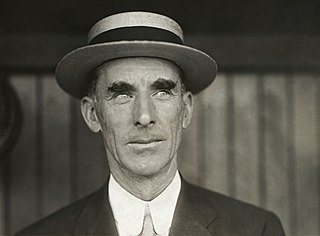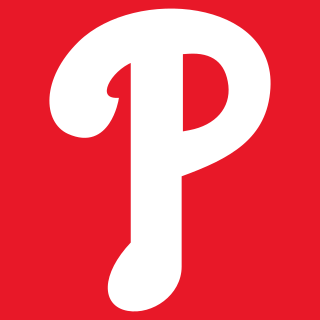Related Research Articles

Blue laws, also known as Sunday laws, are laws designed to restrict or ban some or all Sunday activities for religious or secular reasons, particularly to promote the observance of a day of worship or rest. Blue laws may also restrict shopping or ban sale of certain items on specific days, most often on Sundays in the western world. Blue laws are enforced in parts of the United States and Canada as well as some European countries, particularly in Austria, Germany, Switzerland, and Norway, keeping most stores closed on Sundays.

The Oakland Athletics, often referred to as the A's, are an American professional baseball team based in Oakland, California. The Athletics compete in Major League Baseball (MLB) as a member club of the American League (AL) West division. The team plays its home games at the Oakland Coliseum. They have won nine World Series championships.

Cornelius McGillicuddy, better known as Connie Mack, was an American professional baseball catcher, manager, and team owner. The longest-serving manager in Major League Baseball history, he holds records for wins (3,731), losses (3,948), and games managed (7,755), with his victory total being almost 1,000 more than any other manager.

Shibe Park, known later as Connie Mack Stadium, was a baseball park located in Philadelphia. It was the home of the Philadelphia Athletics of the American League (AL) and the Philadelphia Phillies of the National League (NL). When it opened April 12, 1909, it became baseball's first steel-and-concrete stadium. In different eras it was home to "The $100,000 Infield", "The Whiz Kids", and "The 1964 Phold". The venue's two home teams won both the first and last games at the stadium: the Athletics beat the Boston Red Sox 8–1 on opening day 1909, while the Phillies beat the Montreal Expos 2–1 on October 1, 1970, in the park's final contest.

Baker Bowl is the best-known popular name of a baseball park that formerly stood in Philadelphia, Pennsylvania, United States. Its formal name, painted on its outer wall, was National League Park. It was also initially known as Philadelphia Park or Philadelphia Base Ball Grounds / Park.

Columbia Park or Columbia Avenue Grounds was a baseball park in Philadelphia. It was built in 1901 as the first home of the Philadelphia Athletics, who played there for eight seasons, including two games of the 1905 World Series.

In the 1914 World Series, the Boston Braves beat the Philadelphia Athletics in a four-game series.

The City Series was the name of a series of intracity baseball games played between Major League Baseball's Philadelphia Athletics of the American League and Philadelphia Phillies of the National League that ran from 1883 through 1954. While the games were officially exhibitions, they were a matter of prestige in Philadelphia and a long rivalry existed between the players, management, and fans.

Benjamin Franklin Shibe was an American sporting goods and baseball executive who was owner and president of the Philadelphia Athletics of the American League from 1901 until his death. He is credited with the invention of the automated stitching machinery to make standardized baseballs. Shibe Park was named in his honor from 1909 to 1954. Shibe died in 1922, and is buried in West Laurel Hill Cemetery, Bala Cynwyd, Pennsylvania.
The 1929 Boston Red Sox season was the 29th season in the franchise's Major League Baseball history. The Red Sox finished last in the eight-team American League (AL) with a record of 58 wins and 96 losses, 48 games behind the Philadelphia Athletics, who went on to win the 1929 World Series.
The 1932 Boston Red Sox season was the 32nd season in the franchise's Major League Baseball history. The team's home field was Fenway Park. The Red Sox finished last in the eight-team American League (AL) with a record of 43 wins and 111 losses, 64 games behind the New York Yankees, who went on to win the 1932 World Series.
Lewis Bernard Krausse was an American pitcher and scout in Major League Baseball from Media, Pennsylvania. He pitched in parts of the 1931 and 1932 seasons for the Philadelphia Athletics. When he was called up to the Athletics in 1931, he was the American League's youngest player.
The Pittsburgh Stars or Pittsburg Stars were a professional American football team based in Pittsburgh, Pennsylvania that were only in existence for one season in 1902. The team was member of what was referred to as the first National Football League, which has no connection with the National Football League of today. The whole league was a curious mixture of baseball and football. The Stars were managed and funded, on paper, by Dave Berry, the manager of the professional Latrobe Athletic Association. However, the team was suspected of being secretly financed by the Pittsburgh Pirates. During 1902, the league's only year in existence, the Stars won the league championship, beating out two teams that were financed by the owners of baseball's Philadelphia Athletics and the Philadelphia Phillies.
The Philadelphia Athletics were a professional American football team based in Philadelphia in 1902. The team was member of what was referred to as the National Football League. This league has no connection with the National Football League of today. The whole "league" was a curious mixture of baseball and football. During the league's only year in existence, two of the three teams that were financed by the owners of the Philadelphia Athletics and the Philadelphia Phillies, hence the names Philadelphia Athletics and Philadelphia Phillies. The Pittsburgh Stars made up the third team and was suspected of being financed by the Pittsburgh Pirates baseball team.

The first National Football League (NFL) was the first attempt at forming a national professional American football league in 1902. This league has no ties with the modern National Football League. In fact the league was only composed of teams from Pennsylvania, which meant it was actually regional, despite having locations in the two largest cities in Pennsylvania. Two of the teams were based in Philadelphia, while the third was based in Pittsburgh. This NFL was a curious mixture of football players and baseball players who adapted to playing football. Future Baseball Hall of Famer Rube Waddell was with the Philadelphia Athletics, and pitcher Christy Mathewson a fullback for Pittsburgh. Two of the three teams were owned by the Philadelphia Phillies and Philadelphia Athletics, with the third team suspected of being owned by the Pittsburgh Pirates. The league folded after the 1902 season.
The Philadelphia Phillies were a professional American football team based in Philadelphia, Pennsylvania in 1902. The team was a member of what was referred to as the National Football League—not to be confused with the National Football League of today. The whole league was a curious mixture of football players as well as baseball players who adapted to playing football. The Phillies were owned and financed by baseball's Philadelphia Phillies just as the owners of the Philadelphia Athletics financed their team, the Philadelphia Athletics. The Pittsburgh Stars made up the third team and was suspected of being financed by the Pittsburgh Pirates baseball team.

Wayne Harper Ambler was an American professional baseball player whose career spanned six season, including three in Major League Baseball with the Philadelphia Athletics (1937–1939). Over his career in the majors, Ambler player second base and shortstop. He also played in the minor leagues. Ambler played for the Class-A Williamsport Grays (1939), the Double-A Jersey City Giants (1940) and the Double-A Indianapolis Indians (1941). Ambler made his major league debut on June 4, 1937, after never playing in the minors, a rare feat. During his major league career, Ambler compiled a batting average of .224 with 175 hits, 39 doubles, two triples, 73 runs batted in (RBIs) and four stolen bases in 271 games played.

Sabbatarianism advocates the observation of the Sabbath in Christianity, in keeping with the Ten Commandments. The observance of Sunday as a day of worship and rest is a form of first-day Sabbatarianism, a view which was historically heralded by nonconformist denominations, such as Congregationalists, Presbyterians, Methodists, and Baptists, as well as many Episcopalians.

Puritan Sabbatarianism or Reformed Sabbatarianism, often just Sabbatarianism, is observance of Sabbath in Christianity that is typically characterised by devotion of the entire day to worship, and consequently the avoidance of recreational activities.
The Oakland Athletics, a current Major League Baseball franchise, originated in Philadelphia. This article details the history of the Philadelphia Athletics, from 1901 to 1954, when they moved to Kansas City.
References
- 1 2 3 4 5 6 7 8 9 10 11 12 "The Fight for Sunday Baseball in Philadelphia". Philadelphia Athletics Historical Society. 2007. Archived from the original on 2008-07-06. Retrieved 2008-09-23.
- 1 2 3 "NYC'S BLUE LAWS". Gotham Gazette. 2003-05-26. Retrieved 2008-09-23.
- ↑ "Baseball Men Exonerated. Magistrate McQuade Commends Managers for Sunday Game" (PDF). New York Times . August 22, 1917. Retrieved 2015-09-02.
- ↑ "Larry Stone, Doubleheaders Are Passe", Baseball Digest, Nov. 2000
- 1 2 Hughes, James R. (2006). "The Sabbath: A Universal and Enduring Ordinance of God" (PDF). Evangelical Presbyterian Church . Retrieved 6 October 2020.
- 1 2 "Why an Evening Worship Service?". Christ United Reformed Church. 8 December 2010. Retrieved 6 October 2020.
- ↑ Jones, M. (12 June 2015). "Organized Sports on Sundays?". Alliance of Confessing Evangelicals . Retrieved 6 October 2020.
- ↑ Edwards, Jonathan. "The Perpetuity and Change of the Sabbath" . Retrieved 24 June 2017.
- ↑ Turley, Steve. "Sports on Sundays: The Consequences of Skipping Church". Turley Talks. Retrieved 24 February 2021.